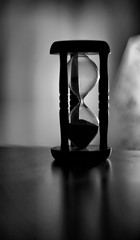Monday, December 17, 2018
OCD A to Z: L is for Lost Time
Lost time is one of my OCD themes. I had a realization that the thoughts about wasting time, doing the wrong thing with my time, or losing time, are not going to magically disappear. I've been waiting for them to go away, and leave me alone.
Everyone has thoughts and uncertainties about whether they are making good use of their time. Mine have been interlinked with perfectionism, and fear of making any kind of mistake, and mental rituals of analyzing the best thing to do at any given moment with my time, not to mention avoiding doing anything at all, in case I choose the wrong thing.
The fact is that I have lost a lot of time due to the OCD. I've struggled with the thought that it's intolerable to have lost time, and I will be unable to survive that grief. I've endeavored to make the thought and the grief go away by analysis, which rebounds into even more focus on what I am trying to escape.
It's the classic, "Don't think of a white bear." What's the first thing that happens? You remind yourself of what not to think of, and there you are thinking about a white bear.
I've lost time doing my rituals. I've lost time while avoiding things I fear. There are phone calls that would be useful to make as I work on my art business, and I lose time because I am afraid of phone calls, of saying the wrong thing, not knowing in advance how the call will go, and I'll freeze while avoiding the call, and get nothing done at all.
What are the ways in which you've lost time due to OCD?
[Revisiting OCD A to Z from 2011]
Wednesday, December 5, 2018
OCD A to Z: K is For Kabat-Zinn and Mindfulness
I had a hard time thinking of a K word, but then Jon Kabat-Zinn popped into my mind. I first came across Full Catastrophe Living about 10 years ago, and what stayed with me was the idea that mindfulness was about focusing on the breath, and if your mind wanders, that is normal, and bringing it back to the breath is all you need to do, even if it only stays a split second. I appreciated the rock-bottom simplicity of this, even in the midst of a very exhausting state of OCD mind.
A few years ago, I also read The Mindful Way Through Depression which comes with a CD of mindfulness exercises, and I listened to them daily for almost a year. For much of my life, depression was intertwined with my OCD, and there are many clinicians researching mindfulness as part of the treatment of OCD in addition to depression. The theory is that the more we fight with our obsessive thoughts, the more entrenched they become, and mindfulness can be an adjunct to Exposure Therapy, a way to practice letting thoughts be there and lessening their charge.
As my therapist pointed out many times, when in the midst of OCD compulsions, I am not in the present moment. I am either in the past, worrying about something that happened, or in the future anticipating "what ifs." He believes the only functional moment is the present one. This is where we make our good decisions, respond to what's actually happening, are most alive. At first I doubted this, because I associated the "present moment" as the one where I was suffering, and compulsing. But slowly I have come to see that in that suffering I am digging into the past or racing into the future. This doesn't mean that the present moment is magical, always calm and peaceful, but it gives a better chance of getting better from OCD. My old rituals don't get me any closer to long term peace.
[Revisiting OCD A to Z from 2011]
Subscribe to:
Posts (Atom)






